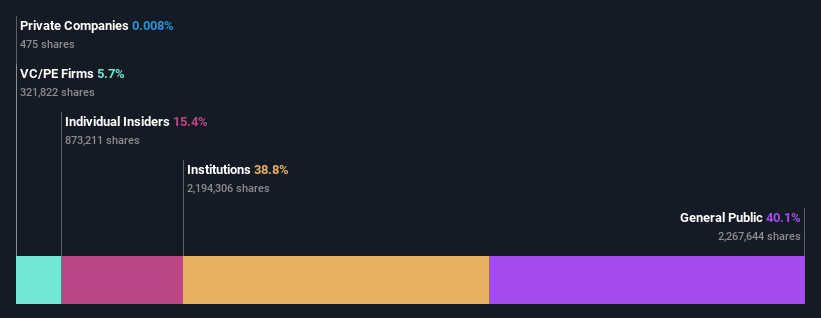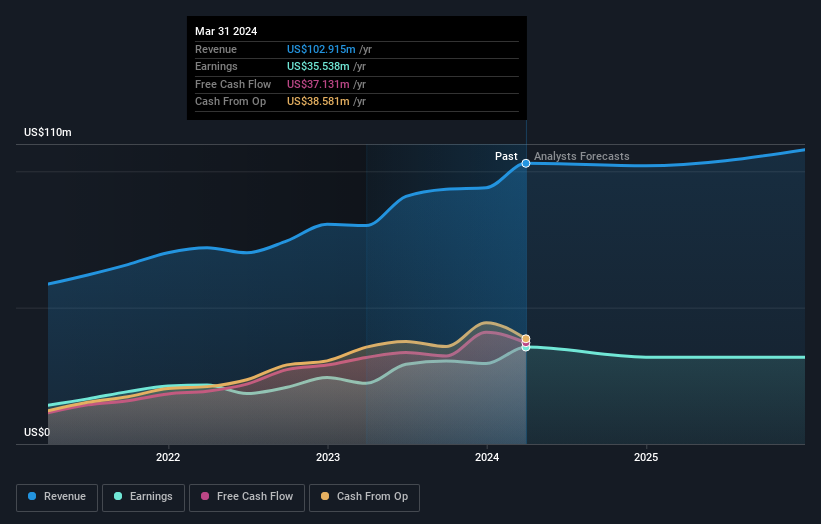Retail investors account for 40% of Orange County Bancorp, Inc.'s (NASDAQ:OBT) ownership, while institutions account for 39%
Key Insights
The considerable ownership by retail investors in Orange County Bancorp indicates that they collectively have a greater say in management and business strategy
The top 12 shareholders own 50% of the company
If you want to know who really controls Orange County Bancorp, Inc. (NASDAQ:OBT), then you'll have to look at the makeup of its share registry. With 40% stake, retail investors possess the maximum shares in the company. In other words, the group stands to gain the most (or lose the most) from their investment into the company.
Meanwhile, institutions make up 39% of the company’s shareholders. Insiders often own a large chunk of younger, smaller, companies while huge companies tend to have institutions as shareholders.
Let's delve deeper into each type of owner of Orange County Bancorp, beginning with the chart below.
Check out our latest analysis for Orange County Bancorp
What Does The Institutional Ownership Tell Us About Orange County Bancorp?
Institutional investors commonly compare their own returns to the returns of a commonly followed index. So they generally do consider buying larger companies that are included in the relevant benchmark index.
We can see that Orange County Bancorp does have institutional investors; and they hold a good portion of the company's stock. This implies the analysts working for those institutions have looked at the stock and they like it. But just like anyone else, they could be wrong. If multiple institutions change their view on a stock at the same time, you could see the share price drop fast. It's therefore worth looking at Orange County Bancorp's earnings history below. Of course, the future is what really matters.
Orange County Bancorp is not owned by hedge funds. The company's largest shareholder is Hudson Valley Investment Advisors, Inc., with ownership of 11%. In comparison, the second and third largest shareholders hold about 5.8% and 5.7% of the stock. Furthermore, CEO Michael Gilfeather is the owner of 0.6% of the company's shares.
After doing some more digging, we found that the top 12 have the combined ownership of 50% in the company, suggesting that no single shareholder has significant control over the company.
Researching institutional ownership is a good way to gauge and filter a stock's expected performance. The same can be achieved by studying analyst sentiments. There is a little analyst coverage of the stock, but not much. So there is room for it to gain more coverage.
Insider Ownership Of Orange County Bancorp
While the precise definition of an insider can be subjective, almost everyone considers board members to be insiders. The company management answer to the board and the latter should represent the interests of shareholders. Notably, sometimes top-level managers are on the board themselves.
I generally consider insider ownership to be a good thing. However, on some occasions it makes it more difficult for other shareholders to hold the board accountable for decisions.
It seems insiders own a significant proportion of Orange County Bancorp, Inc.. It has a market capitalization of just US$261m, and insiders have US$40m worth of shares in their own names. It is great to see insiders so invested in the business. It might be worth checking if those insiders have been buying recently.
General Public Ownership
The general public, who are usually individual investors, hold a 40% stake in Orange County Bancorp. While this size of ownership may not be enough to sway a policy decision in their favour, they can still make a collective impact on company policies.
Private Equity Ownership
Private equity firms hold a 5.7% stake in Orange County Bancorp. This suggests they can be influential in key policy decisions. Sometimes we see private equity stick around for the long term, but generally speaking they have a shorter investment horizon and -- as the name suggests -- don't invest in public companies much. After some time they may look to sell and redeploy capital elsewhere.
Next Steps:
I find it very interesting to look at who exactly owns a company. But to truly gain insight, we need to consider other information, too. Case in point: We've spotted 2 warning signs for Orange County Bancorp you should be aware of, and 1 of them can't be ignored.
But ultimately it is the future, not the past, that will determine how well the owners of this business will do. Therefore we think it advisable to take a look at this free report showing whether analysts are predicting a brighter future.
NB: Figures in this article are calculated using data from the last twelve months, which refer to the 12-month period ending on the last date of the month the financial statement is dated. This may not be consistent with full year annual report figures.
Have feedback on this article? Concerned about the content? Get in touch with us directly. Alternatively, email editorial-team (at) simplywallst.com.
This article by Simply Wall St is general in nature. We provide commentary based on historical data and analyst forecasts only using an unbiased methodology and our articles are not intended to be financial advice. It does not constitute a recommendation to buy or sell any stock, and does not take account of your objectives, or your financial situation. We aim to bring you long-term focused analysis driven by fundamental data. Note that our analysis may not factor in the latest price-sensitive company announcements or qualitative material. Simply Wall St has no position in any stocks mentioned.
Have feedback on this article? Concerned about the content? Get in touch with us directly. Alternatively, email editorial-team@simplywallst.com

 Yahoo Finance
Yahoo Finance 

